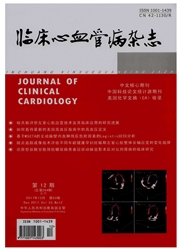

 中文摘要:
中文摘要:
氯吡格雷和阿司匹林联合应用已经成为急性冠状动脉综合征(ACS)及经皮冠状动脉介入(PCI)术后患者的标准治疗方案,可显著降低死亡或心血管事件的发生率。部分患者尽管长期服用常规剂量的氯吡格雷(300mg负荷量,维持量75mg/d),但临床上仍未能有效地防止血栓事件的发生,且血小板功能检测证实血小板聚集不能被有效抑制,这种现象称为氯吡格雷抵抗。氯吡格雷抵抗反映氯吡格雷抗血小板治疗失败。研究表明,氯吡格雷抵抗可能与血栓事件的复发密切相关,并受基因和非基因因素的影响。
 英文摘要:
英文摘要:
The combination of clopidogrel and aspirin has become standard therapy in patients with acute coronary syndrome after percutaneous coronary intervention,which can significantly reduce the incidence of death or cardiovascular events.Although some patients with long-term use of conventional doses of clopidogrel(300mg loading dose,maintenance dose of 75mg/d),but we still cannot effectively prevent the occurrence of thrombotic events in clinical.The platelet function assays confirmed platelet aggregation can not be effectively inhibited.This phenomenon was known as clopidogrel resistance.Clopidogrel resistance reflects that clopidogrel antiplatelet therapy was failure.Studies have shown that clopidogrel resistance may be associated with the recurrence of thrombotic.It may be affected by genetic and non-genetic factors.
 同期刊论文项目
同期刊论文项目
 同项目期刊论文
同项目期刊论文
 期刊信息
期刊信息
